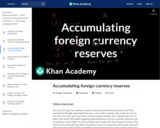
How and why a central bank would build foreign currency reserves. Created by Sal Khan.
- Subject:
- Economics
- Social Science
- Material Type:
- Lesson
- Provider:
- Khan Academy
- Provider Set:
- Khan Academy
- Author:
- Sal Khan
- Date Added:
- 07/27/2021

How and why a central bank would build foreign currency reserves. Created by Sal Khan.
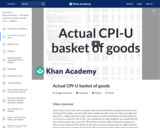
Exploring the actual weightings for the CPI-U basket of goods. Created by Sal Khan.

14.461 is an advanced course in macroeconomics that seeks to bring students to the research frontier. The course is divided into two sections. The first half is taught by Prof. Iván Werning and covers topics such as how to formulate and solve optimal problems. Students will study fiscal and monetary policy, among other issues. The second half, taught by Prof. George-Marios Angeletos, covers recent work on multiple equilibria, global games, and informational fictions.

Professor Blanchard will discuss shocks, labor markets and unemployment, and dynamic stochastic general equilibrium models (DSGE models). Professor Lorenzoni will cover demand shocks, macroeconomic effects of news (with or without nominal rigidities), investment with credit constraints, and liquidity with its aggregate effects.
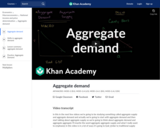
We've learned about demand for a good or service, but aggregate demand is different: its the demand for everything bought in an economy. In this video, we discuss how aggregate demand (AD) is different from demand and why aggregate demand is downward sloping. Created by Sal Khan.
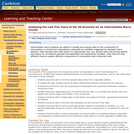
Intermediate students are asked to analyze data on the components of consumption and investment expenditures and explanatory variables based on textbook models of each. Students look for rough correlations between the explanatory and dependent variables.

15.012 Applied Macro- and International Economics uses case studies to investigate the macroeconomic environment in which firms operate. The first half of the course develops the basic tools of macroeconomic management: monetary, fiscal, and exchange rate policy. The class discusses recent emerging market and financial crises by examining their causes and considering how best to address them and prevent them from recurring in the future. The second half evaluates different strategies of economic development. Topics covered in the second half of this course include growth, the role of debt and foreign aid, and the reliance on natural resources.

This course seeks to establish understanding of the development processes of societies and economies by studying several dimensions of sustainability (environmental, social, political, institutional, economy, organizational, relational, and personal) and the balance among them. It explores the basics of governmental intervention, focusing on areas such as the judicial system, environment, social security, and health, and builds skills to determine what type of policy is most appropriate. We also consider implications of new technologies on the financial sector: Internationalization of currencies, mobile payment systems, and cryptocurrencies, and discuss the institutional framework to ensure choices are sustainable across all dimensions and applications.

What happens when governments default on their debts? In this video, Professor Garrett Jones of George Mason University uses the Greek government debt crisis to explain what happens when governments default on their debts and why it's not always a bad thing.

In addition to discretionary fiscal policy, there are policies and institutions that can help reduce swings in the business cycle. This video discusses the role of automatic stabilizers in the business cycle.
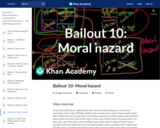
Alternate plans and moral hazard. Created by Sal Khan.
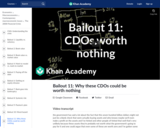
Why a CDO could be worth nothing even though they are "collateralized". Created by Sal Khan.
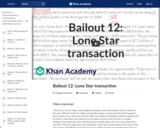
A real life example of a transaction involving CDOs. Created by Sal Khan.
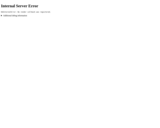
Can the bailout work? Created by Sal Khan.
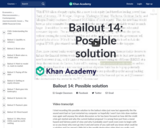
A solution that is MUCH fairer that has a MUCH better chance of working! Created by Sal Khan.
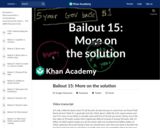
More on the "Plutsky Plan". Created by Sal Khan.
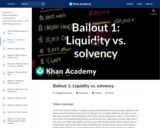
Review of balance sheets. Difference between illiquidity and insolvency. Created by Sal Khan.
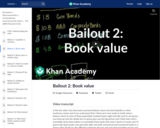
Hypothetical bank balance sheet. What book value means. Created by Sal Khan.
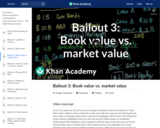
What it means when the market value of a stock is different from its book value. Created by Sal Khan.
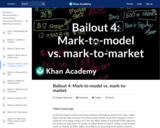
Different ways of accounting for an asset. Mark-to-model vs. mark-to-market. Created by Sal Khan.